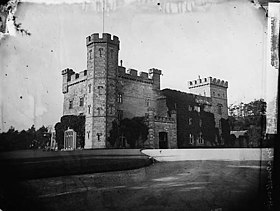Alice Williams (welfare)
Alice Williams CBE or Alice Helena Alexandra Williams; Alys Meirion (12 March 1863 – 15 August 1957) was a Welsh bard, painter and voluntary welfare worker.
Alice Williams CBE | |
|---|---|
 Alice Williams | |
| Born | 12 March 1863 |
| Died | 15 August 1957 |
| Nationality | UK |
| Other names | Alys Meirion |
| Parent(s) | Annie and David Williams |
| Relatives | Arthur Osmond Williams (brother) |
Life

Williams was born in Castel Deudraeth at Penrhyndeudraeth to Annie Louisa Loveday and David Williams. Her father was a Liberal politician landowner. She was the youngest daughter and although her parents had liberal views she was expected to care for her mother. In 1900 her brother, Sir Arthur Osmond Williams, succeeded their father as MP and he went on to support women's suffrage. She was released from the task of caring for her mother when she died in 1904. Williams she set out to complete her relatively poor education with travel.[1] In 1914 the First World War started and during the war Williams worked for the French Wounded Emergency Fund. Williams helped to create a Missing Persons Unit known as the "Signal Bureau". This earnt her a Médaille de la Reconnaissance Française from the French government.[2]
She is credited with creating Lyceum Clubs for women in Paris and Berlin during her visits. Williams could paint and play the piano. She exhibited her watercolours in France and in Britain.[1]
Williams was the chair of one of the first British branches of the Women's Institute at Penrhyndeudraeth. This group built the first Institute Hall.[2] In 1917 the National Federeation of Women Institutes was formed. On 16 October Lady Denman and Grace Hadow were elected chair and vice-chair and Williams was elected honorary secretary and treasurer.[3] Williams was the only volunteer in this role as in 1918 she was replaced by a paid general secretary. She was moved to the executive committee and the following year[2] the NFWI published its first magazine titled ''Home and Country'' and Williams was its first editor. The first edition showed the Queen visiting the W.I. exhibition.[3]
Williams was a member of Union des femmes peintres et sculpteurs and of Union Internationale des Aquarellistes.[2]
She wrote a play titled "Britannia" which was staged by the Women's Institute in Penrhyndeudraeth. More importantly the play was translated into Welsh by Ceridwen Peris. Williams was made a bard with the name of Alys Meirion.[4] Williams eyesight began to fail and she was blind by 1930. Williams was given an Order of the British Empire (CBE) in 1937.[2]
Works include
- 'Aunt Mollie's Story' (1913)
- 'Britannia' (1917)
- 'Britain Awake: An Empire Pageant Play' (1932)
- 'Gossip' (1935)[2]
References
- Ceridwen Lloyd-Morgan, ‘Williams, Alice Helena Alexandra (1863–1957)’, Oxford Dictionary of National Biography, Oxford University Press, 2004 accessed 20 Oct 2017
- Archives, The National. "The Discovery Service". discovery.nationalarchives.gov.uk. Retrieved 2017-10-20.
- "National Federation of Women's Institutes | The origins". www.thewi.org.uk. Retrieved 2017-10-20.
- Jane Robinson (6 October 2011). A Force To Be Reckoned With: A History of the Women's Institute. Little, Brown Book Group. p. 144. ISBN 978-0-7481-1948-6.